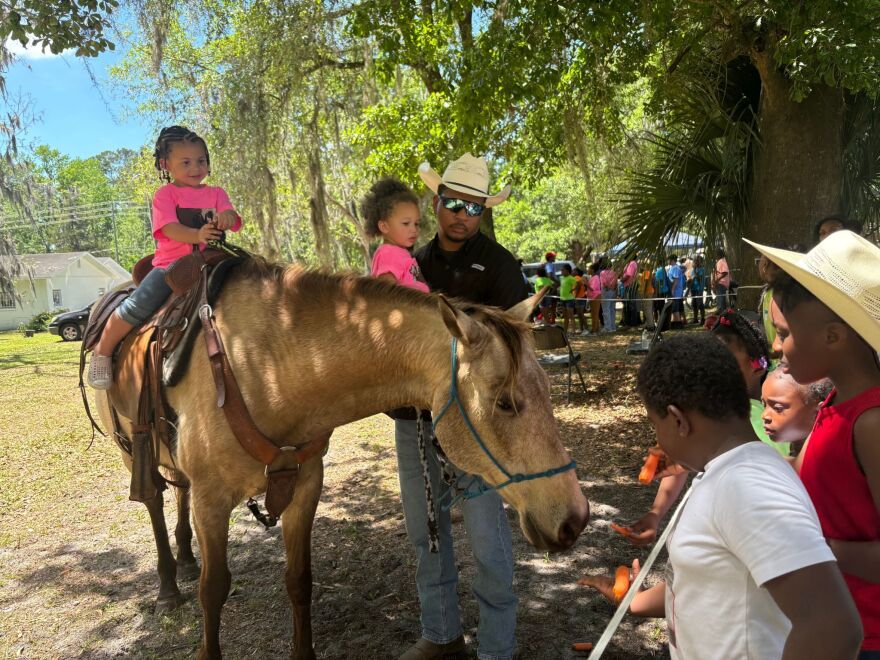At age 5, while most kids are learning to ride bicycles, he was learning how to ride a horse. He didn't know it then, but those early mornings roping and riding would one day earn him the No. 10 spot in the world at the National Little Britches Rodeo Association finals.
For Tayelen Seabrook, rodeo isn't just a sport, to him, it's a lifestyle.
Introduced to the cowboy way of living by his uncle, Rick Wallace, Seabrook's journey began with a single ride.
"He just put me on the horse one day and I took a bit of a liking to it and kept going," Seabrook said. "He kept pushing me and I mean he just seen that I was growing and prospering so I just kept it going."
Seabrook started practicing tie down, a way to rope a calf either for branding or doctoring, at a young age. He competed in his first steer wrestling competition in 2020. In 2022, Tayelen qualified for the NLBRA Finals and finished No. 10 in the world for his accomplishments.
Today, Seabrook and Wallace live in Williston, where they manage their farm, care for the animals and train local kids how to ride.

At many rodeo competitions Seabrook is one of the only – if not the only – Black cowboys competing. Seabrook said he carries a lot of pride with this.
"It means a lot just to know that, you know, a piece of our culture is out there doing what people think we can't do or don't think we have the courage to do," Seabrook said. "Sometimes it does get a little lonely but, you know, I keep my head high."
About 30 miles southwest of Williston is the small town of Rochelle, where farmer John Nix tends to his 80-acre farm, originally started by his grandfather in 1904.
"Cowboying and ranching is not a business to me as much as it is a way of life," Nix said.
His daughter, Ronnica Nix, feels grateful to have grown up immersed in the farm lifestyle, and she carries a deep sense of pride in her culture and legacy.
"I don't ever remember a time that I did not know what my ancestors were or who they were and what the legacy is ever," Ronnica Nix said.
She says the farm taught her lessons that apply to all aspects of life.
"You learn how to care about animals and respect their being on the earth and what they bring to the table of this ecosystem, so then you understand and that carries on the way you treat people in your life," she said.
Now, that respect for land and legacy is being passed on to the next generation.
Keilyn Fuller, John Nix's grandson and Ronnica Nix's son, is already thinking ahead to how he can carry the family's legacy into the future.
"I try to build and think of ideas in the future of how we can change it just by getting finances through cattle and in other ways like tours, agribusiness, weddings," he said.
Fuller hopes to take over the farm one day – not only to preserve what it represents, but to evolve it.
"Obviously it is sentimental to me, but also I want to be able to build it to a point where it's also having multiple sources of income, not just from the meat," he said.
That sense of generational love for farm life runs deep in many Black families in north central Florida, including in the Perry family.
Bobby Perry, son of the late Samuel Pratt Perry, said his late father's dedication to ranching was recognized in a historic way. In 2024, Samuel Pratt Perry posthumously won the Alachua County Cattleman of the Year award.
With tears swelling in Bobby's eyes, he said that his father "was the first African American to do it, but he won't be the last one."
Still, the future of Black farming is uncertain. Nix emphasizes the decline of Black farms throughout the country. According to the USDA, from the early 1900s to now, the number of Black farmers in the nation has decreased from 900,000 to 45,000.
Nix attributes this decline to a multitude of reasons. Trouble finding labor to tend the land, financial struggles and entrenchment with development.
"Large farms are basically taking over price wise, so it makes it really hard to do the inputs when you have small volumes," Nix said. "Unless you do it from a legacy standpoint and you just love the land, from a financial standpoint it's almost better sometimes to sell the land to developers."
But Nix also points out a deeper issue.
"Particularly Black [people] don't like farming because it brings back the idea of slavery and working on the land," Nix said. "So we got to try to change that attitude because they not making no more land."
To help inspire future generations about farming and food security, Nix serves as president of the North Central Florida Black Farmers Association. Through this organization, he works to promote Black landownership and keep regional farmland profitable.

Despite challenges that are both personal and systemic, Black cowboys and farmers across north central Florida continue to ride forward with purpose. Whether it's through rodeo or farming, they are working to ensure that their legacies aren't forgotten, but passed down with pride.
Copyright 2025 WUFT 89.1



